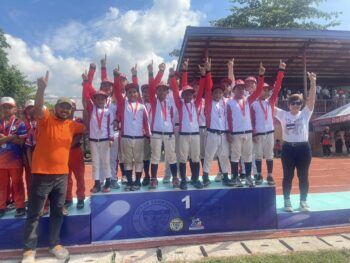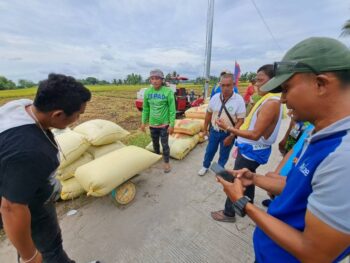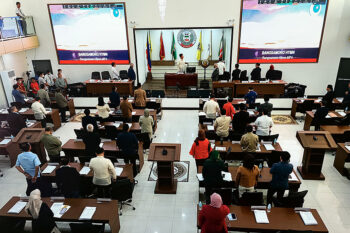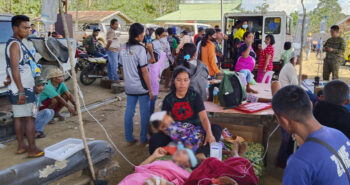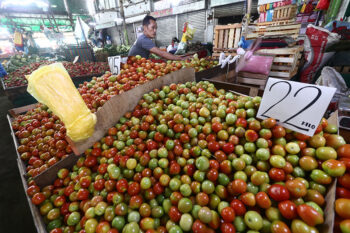“In accepting parish supporters (benefactors or donors), we need to critically consider whether or not what they are giving to the church is a CLEAN money. How could we creatively integrate the value of Integral Ecological concerns in our tithing model or program [and other fund-raising activities]?”
I felt that this question was not sufficiently given attention during our clergy updating on BEC and Tithing concerns on November 8, 2021. For this reason, I made an initiative to express my thoughts to Bishop Noel “Toto” Pedregosa, who kindly advised me to put my humble proposals into writing, which I respectfully submitted to him on November 30, 2021. Hopefully, this Letter would invite serious community discernment among us.
Kalinaw!
The Province of Bukidnon is continually experiencing plenty of ecological disasters that have soil-and-water-related causes. Scientific analysis reveals that this worsening ecological vulnerability is largely due to exploitative/destructive human activities that threatened the rivers, abused the land, destroyed the watershed, and eradicated the biodiversity of nature. Apparently, these layers of interrelated ecological hazards will continually expose our beloved province to more human-induced calamities in the face climate emergency.
Renew Our Commitment to Integral Ecology
The foregoing ecological threats can still be mitigated if we are willing to institutionalize our earlier responses. It can be recalled that, since the 1990s, our diocese has initially made an explicit commitment to promote environment-friendly practices and ecologically appropriate technologies. For this reason, our very own radio station dxDB-AM adamantly refuses to advertize ecologically destructive products including insecticides, pesticides, synthetic fertilizers, and other unsustainable practices. As a prize, this media apostolate has not become beholden to the proponents of unsustainable practices. On the contrary, it enjoys a certain level of credibility even as it criticizes and denounces the ecologically unsustainable practices.
Building on his predecessors’ ecological advocacy, Bishop Noel “Toto” Pedregosa, D.D. vowed “to make the environment one of the central issues of my advocacy.” In his words: “my mission extends to the environment, as seen in my coat of arms as bishop of Malaybalay. One can see a tree rooted in greenery at the bottom of my coat of arms. It represents the strong ecological thrust of the entire church, particularly in the context of Bukidnon…”[1]
Institutionalize Our Integral Ecological Commitment
In response to Bishop Pedregosa’s personal commitment to embrace the ecological principles of Laudato Si’, we are strongly challenged to institutionalize it in our diocesan ministries and advocacies. What dxDB-AM has initially practiced since 1990s may be appropriately extended and contextually applied to the rest of Catholic institutions in our diocese. Hopefully, this noble institutional commitment will make the church’s prophetic witnessing faithfully credible in the face of climate emergency.
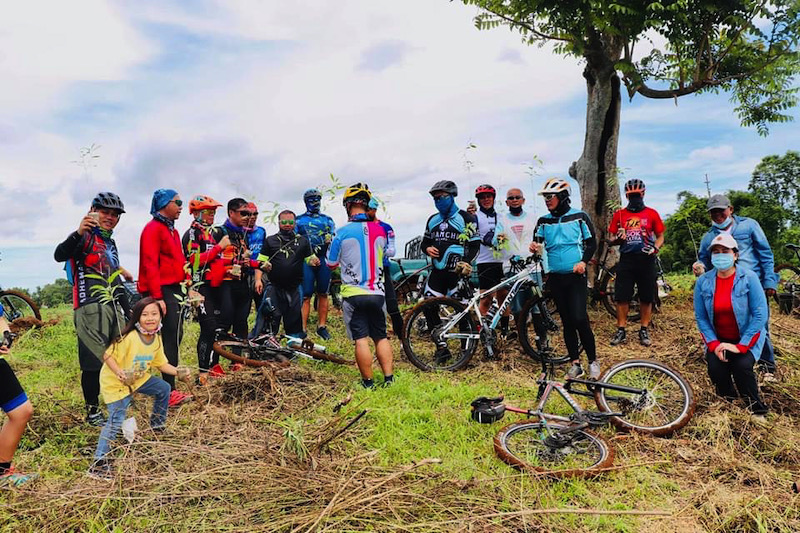
Exercise Our Prophetic Witnessing to Care for Our Common Home
To concretize our prophetic witnessing to care for our Common Home, we are strongly challenged to do two interrelated tasks: (1) to creatively integrate the integral ecological principles of Laudato Si’ in our proclamation of and reflection on the gospel and (2) to categorically denounce the evils of ecologically destructive activities including unsustainable projects that destroy the critical watersheds and employ proven harmful technology of large-scale monocropping of agribusiness companies that consequently poison the land, erode the soil, silt the rivers, endanger the biodiversity, impoverish the farmers, among others.
Apparently, the second prophetic task is more difficult to embrace, as it challenges us to embrace the Laudato Si’principles seriously that may create conflicts and divisions both in the ad intra and ad extra ministries of the church. However, following the way of Jesus Christ, who would rather choose to suffer the pain of “division” for the sake of the gospel than to establish a facile worldly peace (cf. Luke 12:51), embracing freely this inconvenient consequence of our prophetic witnessing is certainly a noble commitment.
Be Consistent with Our Integral Ecological Commitment
Furthermore, to be consistent with our integral ecological commitment, we are challenged to critically overcome two naïve practices that may make us accomplices of unsustainable activities. One is about asking and receiving money from ecologically destructive sources. It would be morally inconsistent with our institutional ecological commitment to receive “dirty money” or money earned immorally, either by mistreating others or by destroying the integrity of creation. In fact, the Diocese of Tandag has been advocating this as early as 2013 when its clergy made a definite policy not to receive or ask “money or any material goods coming from mining companies, banana plantations or any other company that involves activities destructive to the environment.” In 2016, Pope Francis affirmed this practice by saying that the Church does not want dirty money.[2]
The other equally uncritical practice has something to do with the financial resources of Catholic institutions (e.g., dioceses, churches, schools, seminaries, religious houses, etc.) being invested in ecologically destructive projects. The CBCP is very clear about this practice: “Do not allow financial resources of our Catholic institutions to be invested in favor of coal-fired power plants, mining companies and other destructive extractive projects. Divestment from such investment portfolios must be encouraged.”[3] As a Catholic institution that claims to embrace the principles of Laudato Si’, it would be morally inconsistent to engage in unsustainable practices and to become their accomplice, either consciously or unconsciously. To overcome this complicity, we are strongly encouraged to maximize our investments in ecologically friendly activities and projects.
Go Beyond Green Activities
Lastly, to improve our ecological advocacy at this time of climate emergency, it appears that purely environmental responses (e.g., planting/growing trees, segregating wastes properly, doing clean-up drive, etc.) to the above-mentioned deadly ecological sins (e.g., human activities that threatened the rivers, abused the land, destroyed the watershed, and eradicated the biodiversity) are no longer adequate. We need to use both legal and extra-legal means to treat these concerns in the context of justice—or more precisely, ecological justice.
Ecological tragedies must be seen as urgent issues of justice between perpetrators and victims. For instance, unsustainable practices that make our place uninhabitable are a violation of the principle of inter-generational justice. Thus, as ministers of healing and reconciliation, we have the moral and religious duty to prophetically denounce these ecological sins and it is part of our mission to find appropriate ways (both legal and extra-legal) to make the perpetrators (who are still alive and capable) obliged to give justice to their victims and equitably shoulder the cost of restitution and reparation of the damaged ecosystem.
In Christ Jesus,
Fr. Reynaldo D. Raluto
Parish Administrator
Jesus Nazareno Parish
Brgy. Crossing, Libona, Bukidnon
November 30, 2021
Email: reyraluto@yahoo.com
[MindaViews is the opinion section of MindaNews. Reynaldo D. Raluto is a Roman Catholic priest of the Diocese of Malaybalay. He is the Academic Dean of St. John Vianney Theological Seminary in Cagayan de Oro where he also teaches fundamental/systematic theology and Catholic social teaching. He is the author of Poverty and Ecology at the Crossroads: An Ecological Theology of Liberation in the Philippine Context (Quezon City: Ateneo de Manila University Press, 2015). He is also currently assigned as Parish Administrator of Jesus Nazareno Parish in Libona, Bukidnon and works at the Integral Ecology Ministry of the Diocese of Malaybalay. His main ecological advocacy includes planting/growing Philippine native trees, mountain climbing, and participating in cultural and ecological activities of Indigenous Peoples.]
[1] Quoted in Catholic News Service, “New bishop in Philippines pledges an environment-focused ministry,” National Catholic Reporter (September 18, 2021), https://www.ncronline.org/news/earthbeat/new-bishop-philippines-pledges-environment-focused-ministry (accessed September 19, 2021).
[2] See Isla Binnie and Jon Boyle, “Pope says Church does not want ‘dirty money’,” Reuters (March 2, 2016); https://www.reuters.com/article/us-pope-poverty-idUSKCN0W4160 (accessed 11 November 2021).
[3] Catholic Bishops’ Conference of the Philippines, “An Urgent Call for Ecological Conversion, Hope in the Face of Climate Emergency,” CBCP News (July 16, 2019); https://cbcpnews.net/cbcpnews/an-urgent-call-for-ecological-conversion-hope-in-the-face-of-climate-emergency/ (accessed July 20, 2019).


